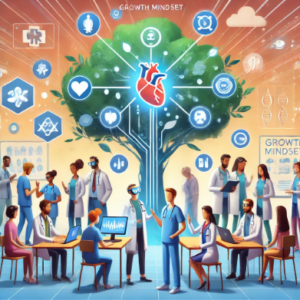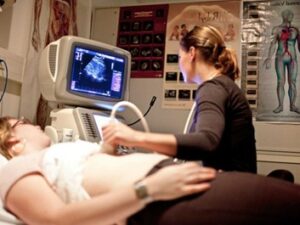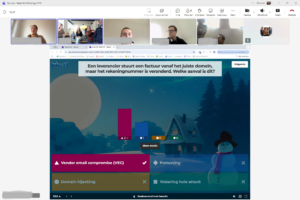A ‘Growth Mindset’ Contributes to Optimal Learning Conditions in Medical Education
Article: A growth mindset, when combined with Entrustable Professional Activities (EPAs), creates a powerful and supportive learning environment that fosters continuous growth in medical education.
By Roel Smabers and Robert Smeenk
Introduction
The concept of a growth mindset, introduced largely thanks to the work of Carol Dweck, is gaining increasing significance. This is especially true in medical education, where it is crucial that current and future professionals can perform effectively. When combined with Entrustable Professional Activities (EPAs), a growth mindset provides a structured framework for professional development and helps in achieving “entrustment.” In addition, both concepts can be integrated into a programmatic assessment approach, in which systematic feedback on growth and development—collected from multiple data sources—offers a more objective picture of progress. Together, these three elements—growth mindset, EPAs, and programmatic assessment—form a powerful triad for creating an effective learning environment. This article explores how connecting these three concepts can amplify their impact.

The essence of mindset theory
Carol Dweck’s mindset theory distinguishes between two fundamental ways of thinking: a fixed mindset and a growth mindset.
- Fixed mindset: People believe their abilities are static and cannot meaningfully change.
- Growth mindset: People see their abilities as malleable, believing they can grow through effort and learning.
Characteristics of a fixed mindset:
- Avoiding challenges: Challenging situations are often avoided, as they are seen as threats rather than opportunities, leading to missed chances for growth.
- Giving up easily: Obstacles are interpreted as signs of inherent inability rather than natural parts of the learning process.
- Seeing effort as pointless: Effort is viewed as evidence of a lack of talent rather than a pathway to mastery.
- Ignoring useful feedback: Feedback may feel like a personal attack, limiting the ability to adapt and improve.
- Feeling threatened by others’ success: Others’ achievements can cause jealousy and demotivation, reducing self-confidence.
Characteristics of a growth mindset:
- Embracing challenges: Challenges are sought out as opportunities to grow and develop new skills.
- Persevering through setbacks: Failures are seen as temporary obstacles and learning opportunities, fostering resilience.
- Viewing effort as the path to mastery: Improvement and success come through consistent practice and dedication.
- Learning from criticism: Feedback is valued as a tool for continuous improvement.
- Finding inspiration in others’ success: Others’ achievements motivate personal goal-setting and perseverance.
How mindsets develop
A fixed mindset often develops from a combination of personal experiences, upbringing, and personality, leading to the belief that intelligence and abilities are unchangeable. This can be reinforced by environments that emphasize talent over effort. In contrast, a growth mindset develops through positive learning experiences, encouragement to take on challenges, and the normalization of mistakes as part of learning. Educational environments that focus on effort, perseverance, and the learning process rather than outcomes help foster a growth mindset.
In medical education, much attention is paid to the learning climate. Hospitals regularly survey interns and residents to assess it. Creating a safe and stimulating learning environment is challenging, especially where mistakes can have serious consequences. The pressure to perform can overshadow the opportunity to learn. Structured approaches like EPAs and programmatic assessment can help counterbalance this by encouraging a growth-oriented learning climate.
Growth mindset in medical education and EPAs
A growth mindset fosters a love of learning and resilience—both essential for academic and clinical success. It helps medical students and practitioners handle feedback, improve clinical skills, and maintain motivation. It encourages seeing failures as opportunities, which is critical in the complex world of healthcare.
EPAs provide a structured pathway for professional development, gradually increasing responsibility as competence grows—aligning perfectly with growth mindset principles. This synergy not only enhances clinical skill development but also creates a more supportive and inclusive learning environment.
Synergy between growth mindset and programmatic assessment
One barrier to a positive learning climate is the perception that assessments are unfair. Single-point assessments can reinforce this problem. In contrast, multi-source and multi-moment assessments—combined with ongoing, lower-stakes feedback—boost learner motivation.
Programmatic assessment acts as a catalyst alongside growth mindset and EPAs. By collecting multiple data points and presenting them in dashboards, both learners and assessors gain a clearer, more transparent view of progress. Continuous feedback throughout the learning journey—not just at the end of a course—encourages risk-taking, reflection, and personal growth.
E-portfolios as a catalyst for growth mindset
An e-portfolio platform—such as Scorion—integrates these three concepts effectively. Programmatic assessment is nearly impossible to implement well on paper; without a digital tool, feedback quickly loses its timeliness. Likewise, EPAs require a portfolio tailored to the content and structure of the medical curriculum, making generic “course-oriented” portfolio systems insufficient.
By promoting ongoing reflection and documentation of learning experiences, an e-portfolio helps learners visualize their growth. It supports continuous tracking of progress over time, reinforcing the idea that skills and knowledge develop through effort. It also facilitates timely feedback, encouraging learners to see challenges as opportunities rather than threats. Documenting both successes and learning moments fosters a mindset in which mistakes are valued as essential steps in the learning process.
An integrated approach
An integrated approach in medical education combines growth mindset, EPAs, programmatic assessment, and a flexible e-portfolio to create a holistic learning environment. Here, assessment becomes an integral part of learning—often referred to as assessment as learning. Workplace-based assessments (WBAs) offer continuous, real-world feedback, connecting clinical performance directly to learning goals. This combination encourages students to embrace challenges, provides clear professional targets, and supports lifelong learning.
Conclusion
A growth mindset contributes significantly to the development of medical professionals by encouraging perseverance and the embrace of challenges. When combined with innovative educational methods like EPAs and programmatic assessment, it creates a highly effective learning environment that promotes continuous growth.
Literature
- Baars-van Moorsel, M. (2004). Leerklimaat in ziekenhuizen. [Uitgever onbekend].
- Bostwick, K. C., Collie, R. J., Martin, A. J., & Duineveld, J. J. (2023). Growth Mindset Interventions in Education: A Systematic Review of Operational Characteristics and Psychological Processes That Affect Learning. Review of Educational Research, 93(2), 244–289. https://doi.org/10.3102/00346543221129277
- Erasmus MC. (z.d.). Programmatisch Toetsen. Geraadpleegd op 31 oktober 2024, van https://www.erasmusmc.nl/nl-nl/erasmusarts2030/programmatisch-toetsen
- Harvard Macy Institute. (z.d.). Growth Mindset and Medical Education. Geraadpleegd op 31 oktober 2024, van https://harvardmacy.org/blog/growth-mindset-and-medical-education
- Medilex Onderwijs. (z.d.). Growth Mindset. Geraadpleegd op 31 oktober 2024, van https://www.medilexonderwijs.nl/onderwijs-begrippen/growth-mindset/
- Persona Talent. (z.d.). How to Cultivate a Growth Mindset. Geraadpleegd op 31 oktober 2024, van https://www.personatalent.com/development/how-to-cultivate-a-growth-mindset/
- Teherani, A., Perez, G., Muller-Juge, V., Lupton, K., Hauer, K. E., & Lucey, C. R. (2020). A Growth Mindset Culture in Medical Education: Critical Reflections and Practical Application. Medical Education, 54(12), 1077-1082. https://pmc.ncbi.nlm.nih.gov/articles/PMC7691162/
- The Curbsiders. (2022, 15 februari). Teach Podcast. Geraadpleegd op [31 oktober 2024], van https://thecurbsiders.com/teach-podcast/10-2
- The DO. (2024, januari). 7 Ways Med Students and DOs Can Cultivate a Growth Mindset. Geraadpleegd op [voeg datum in], van https://thedo.osteopathic.org/2024/01/7-ways-med-students-and-dos-can-cultivate-a-growth-mindset/
- The Happy Investors. (z.d.). Fixed Mindset. Geraadpleegd op 31 oktober 2024, van https://thehappyinvestors.nl/fixed-mindset/
- Unfurl Mind. (z.d.). Embracing Challenges: A Guide to Developing a Growth Mindset. Geraadpleegd op [voeg datum in], van https://unfurlmind.com/embracing-challenges-a-guide-to-developing-a-growth-mindset/
- UVA Health. (2024, 25 juli). Educators Urge Caution About Growth Mindset Trend. Geraadpleegd op 31 oktober 2024, van https://newsroom.uvahealth.com/2024/07/25/educators-urge-caution-about-growth-mindset-trend/
- Vega, D. (z.d.). Perseverance: Key to Conquer Obstacles in Personal Development. Geraadpleegd op 31 oktober 2024, van https://www.linkedin.com/pulse/perseverance-key-conquer-obstacles-personal-development-danette-vega
- Yeager, D. S., & Dweck, C. S. (2020). What can be learned from growth mindset controversies? American Psychologist, 75(9), 1269–1284. https://pubmed.ncbi.nlm.nih.gov/34410891/
- [Auteur onbekend]. (2024). Beware False Growth Mindset: Building Growth. Academic Medicine, 99(3), [paginanummers]. https://journals.lww.com/academicmedicine/fulltext/2024/03000/beware_false_growth_mindset__building_growth.13.aspx
- Schut, S., Maggio, L. A., Heeneman, S., van Tartwijk, J., van der Vleuten, C., & Driessen, E. (2021). Where the rubber meets the road — An integrative review of programmatic assessment in health care professions education. Perspectives on Medical Education, 10(1), 6-13. https://doi.org/10.1007/s40037-020-00625-w



